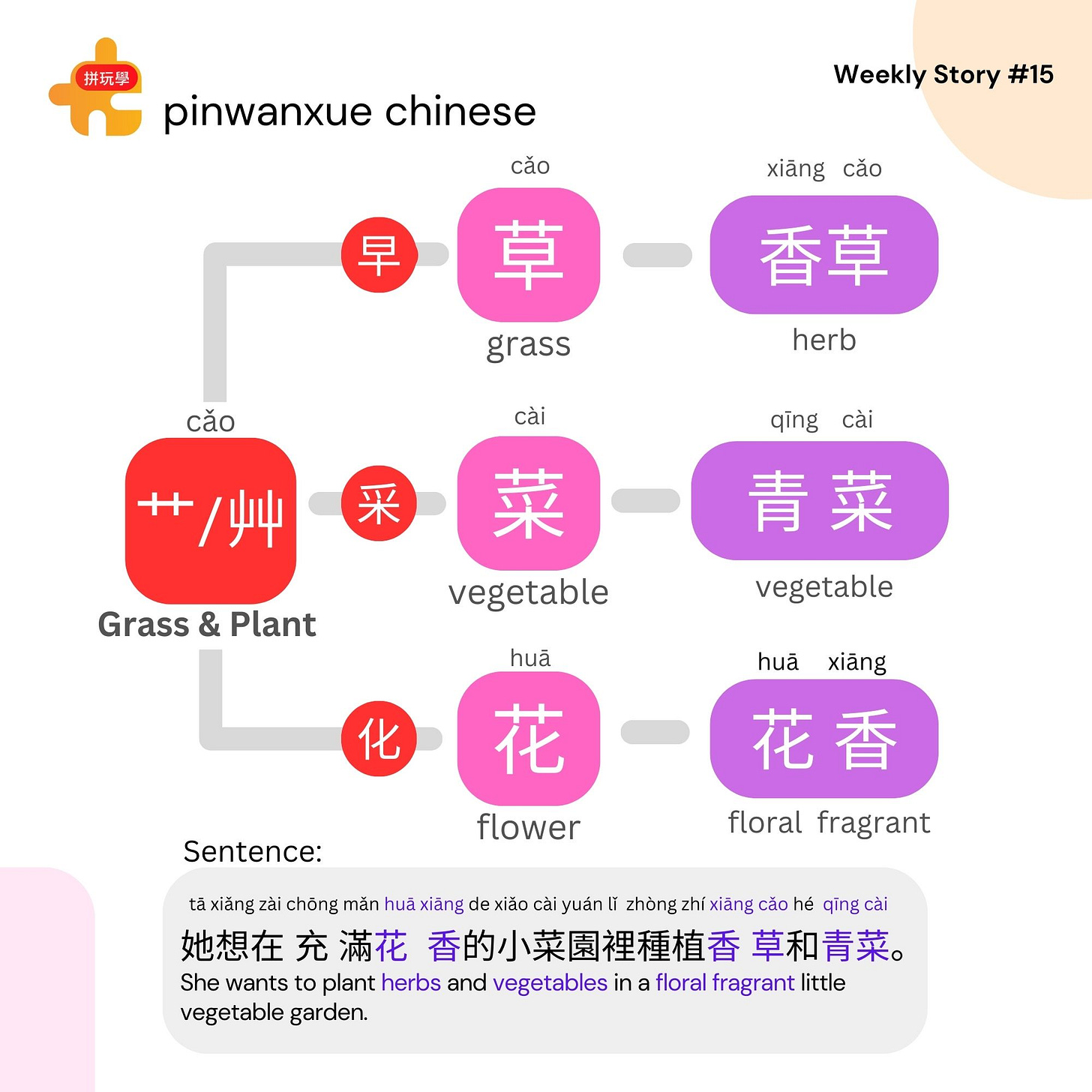Let's talk about the 艹/艸 radical! This radical, meaning "grass" or "plant", adds a meaning of nature and vegetation to Chinese characters. It frequently appears in characters related to plants, vegetation, and herbal elements, emphasizing their meaning.
Take, for example, the character 草 (cǎo), which means "grass." The 艹/艸 radical in this character symbolizes the essence of plants and vegetation. Similarly, the character 菜 (cài) means "vegetable," and once again, the 艹/艸 radical emphasizes its connection to plants.
Moreover, the 艹/艸 radical can contribute to a character's overall meaning by evoking associations with fragrance and aroma. Let's consider the character 花 (huā), meaning "flower"! In the context of flowers, the radical hints at their fragrances.
So, when encountering characters containing the radical 艹/艸, such as 草, 菜, and 花, you can associate them with plants, vegetation, and the natural world. Understanding this connection will help you in comprehending the Chinese language. 😊
Chinese Radical 艹/艸 : Story
Audio:
她想在充滿花香的小菜園裡種植香草和青菜。她每天都要在小菜園裡澆水、除草,讓香草和青菜茁壯成長。不僅如此,她還要用自己種植的香草和青菜做菜,讓家人和朋友們一起品嚐。當這些花草開花時,她想菜園裡將會瀰漫著花香,她和家人每天都能聞到花香,也能感受到大自然的美好。她覺得種植這些花花草草將令她心情愉快,那一定會帶給她很大的樂趣!
English
She wants to plant herbs and vegetables in a fragrant little vegetable garden. Every day, she waters and weeds in the small vegetable garden, allowing the herbs and vegetables to thrive and grow. Not only that, she also cooks with the herbs and vegetables she grows, allowing her family and friends to taste them together. When these flowers bloom, she imagines that the garden will be filled with a floral fragrance, and she and her family can smell the flowers and experience the beauty of nature every day. She believes that planting these flowers and plants will bring her joy and a lot of pleasure!
Example Sentences
xiāng cǎo
香草 - herbs
wǒ xǐhuān zài cài yuán lǐ zhòngzhí gèzhǒng xiāng cǎo, rú bómò hé mídiéxiāng
我喜歡在菜園裡種植各種香草,如薄荷和迷迭香。 I enjoy planting various herbs in the garden, such as mint and rosemary.
dāng wǒ xūyào xiāng cǎo shí, wǒ huì qù cài yuán lǐ jiǎn xià xīnxiān de yèzi
當我需要香草時,我會去菜園裡剪下新鮮的葉子。 When I need herbs, I go to the garden and cut fresh leaves.
qīng cài
青菜 - leafy vegetables
wǒ měitiān zài cài yuán lǐ zhòngzhí xīnxiān de qīng cài, rú bōcài hé shēngcài
我每天在菜園裡種植新鮮的青菜,如菠菜和生菜。 I plant fresh leafy vegetables in the garden every day, such as spinach and lettuce.
tā xǐhuān yòng xīnxiān de qīng cài zuò cài
她喜歡用新鮮的青菜做菜。She likes to cook with fresh leafy vegetables.
huā xiāng
花香 - floral fragrance
chūntiān de huāyuán lǐ mǐmàn zhe huā xiāng, ràng rén xīnqíng yúyuè
春天的花園裡瀰漫著花香,讓人心情愉悅。The garden in spring is filled with the fragrance of flowers, which brings joy to people's hearts.
huā yuán lǐ zǒng shì piāozhe huā xiāng
花園裡總是飄著花香。 The garden is always filled with the fragrance of flowers.
huā huā cǎo cǎo
花花草草 - flowers and plants
tā duì huā huā cǎo cǎo qíng yǒu dú zhōng, měi gè jì jié dōu huì zhòng zhí bù tóng de huā cǎo lái fēng fù huā yuán
她對花花草草情有獨鍾,每個季節都會種植不同的花草來豐富花園。She has a special love for flowers and plants, and she plants different flowers and plants each season to enrich the garden.
cài yuán lǐ zhǒngle hěnduō měilì de huā huā cǎo cǎo
菜園裡種了很多美麗的花花草草。There are many beautiful flowers and plants in the garden.
Hope you're enjoying my short story! For more tips on Chinese, subscribe to me. 😊 It’s free, and a paid subscription is optional. Thanks!
Keywords
xiǎo cài yuán
小菜園 - small vegetable garden
zhòng zhí
種植 - to plant
chōng mǎn
充滿 - filled with
jiao shuǐ
澆水 - watering
chú cǎo
除草 - weeding
zhuó zhuàng
茁壯 - thriving
pǐn cháng
品嚐 - taste
mí màn
瀰漫 - pervade
xīn qíng yú kuài
心情愉快 - joyful mood
(lè qù)
樂趣 - pleasure



